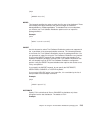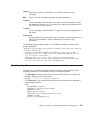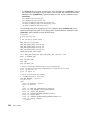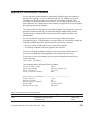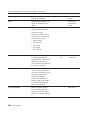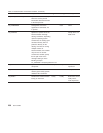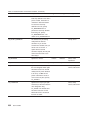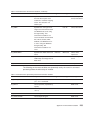
Appendix A. Environment Variables
You can set environment variables to describe the TeamConnection environment in
which you are working. You are not required to set your TC_FAMILY environment
variable for the TeamConnection client command line interface. However, if the
TC_FAMILY environment variable is not set, the -family must be specified for every
client command. See “Setting environment variables” on page 234 for more information
about setting environment variables.
The names of the TeamConnection environment variables, the purpose they serve, the
equivalent TeamConnection flag, the equivalent Settings notebook field, and the
TeamConnection component that uses the environment variable are listed in the
following table.
You can override the value you set for an environment variable by using the
corresponding flag in a TeamConnection command. When an environment variable has
a Settings notebook equivalent, TeamConnection uses the two as follows:
v The environment variable controls the command line interface.
v The Settings notebook controls the graphical user interface.
If there is no Settings notebook equivalent for the environment variable, then the
environment variable takes effect regardless of the interface you are using.
To see some of your client settings, you can issue the following command from a
command prompt:
teamc report -testServer
This command returns information like the following:
Connect to Family Name: ptest
Server TCP/IP Name: amachine.company.com
Server IP Address: 9.1.23.45
Server TCP/IP Port Number: 9999
Server Specific Information ----------------------------------
Product Version: 3.0.0
Operating System: AIX
Message catalog language: English
Server Mode: non-maintenance
Authentication Level: HOST_ONLY
Table 3. TeamConnection environment variables
Environment variable Purpose Flag Setting Used by
LANG Specifies the language-specific
message catalog.
Client, family
server
© Copyright IBM Corp. 1992, 1995, 1996, 1997, 1998
227



